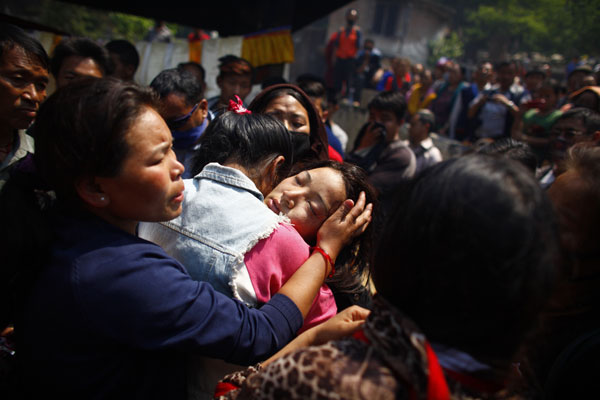
Daughter of Nepalese mountaineer Ang Kaji Sherpa, killed in an avalanche on Mount Everest, cries during the funeral ceremony in Katmandu, Nepal, Monday, April 21, 2014. Buddhist monks cremated the remains of Sherpa guides who were buried in the deadliest avalanche ever recorded on Mount Everest, a disaster that has prompted calls for a climbing boycott by Nepal’s ethnic Sherpa community. The avalanche killed at least 13 Sherpas. Three other Sherpas remain missing and are presumed dead. AP
KATHMANDU—Tensions mounted Tuesday at Everest base camp as frustrated mountaineers who have paid tens of thousands of dollars to climb the world’s highest peak faced disappointment due to a strike threat by guides.
Thirteen sherpa guides were killed and another three are presumed dead after a devastating avalanche last Friday in the most deadly accident ever on the 8,848-metre (29,029-foot) mountain.
The guides have since asked for a pause in expeditions as a mark of respect for their fallen colleagues, and have threatened to cancel all climbing on Mount Everest from this month onwards unless the government revises their insurance limits and sets up a welfare fund.
Ed Marzec, a retired lawyer who had planned to become the oldest American to conquer Everest at the age of 67, said he had decided to abandon his mission after losing a member of his grief-stricken team.
Speaking from base camp, he said the atmosphere between some climbers and their guides was souring — even as a memorial was set to take place for those lost in the accident, which occurred just ahead of the start of the summer climbing season.
“Things are getting pretty ugly and we have a lot of young climbers keen to summit going from tent to tent, trying to convince people to put pressure on the sherpas so they don’t cancel,” Marzec said.
His views were echoed in an online account by veteran mountaineer Tim Rippel, who leads expeditions with his company Peak Freaks.
“Sherpa guides are heating up, emotions are running wild,” Rippel wrote on his blog. “Things are getting very complicated and there is a lot of tension here and it’s growing,” he wrote.
Relations between local guides and Western mountaineers hit a low last year when a brawl broke out between three European climbers and a group of sherpas.
The guides have given the government until Monday to respond to their demands, which include a request to pay $10,000 to families of the guides killed in the avalanche as well as those who were injured and are unable to resume work.
Sherpas have also asked the government to pay the medical expenses of the injured, many of whom are recovering in hospital.
The disaster has underscored the risks borne by sherpas who ascend the icy slopes, often before dawn and usually weighed down by tents, ropes and food for wealthy clients.
Sherpas earn between $3,000 to $6,000 a season, but their insurance cover is almost always inadequate when accidents happen.
More than 300 people, most of them local guides, have died on the peak since the first ascent by Edmund Hillary and Tenzing Norgay in 1953.
RELATED STORIES
13th body pulled from snow in Everest avalanche
Search resumes for bodies in Everest avalanche